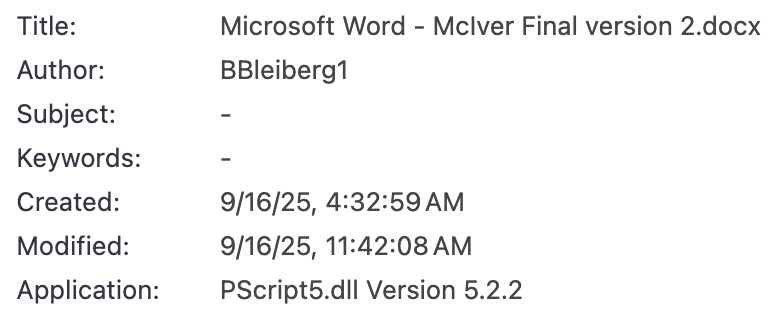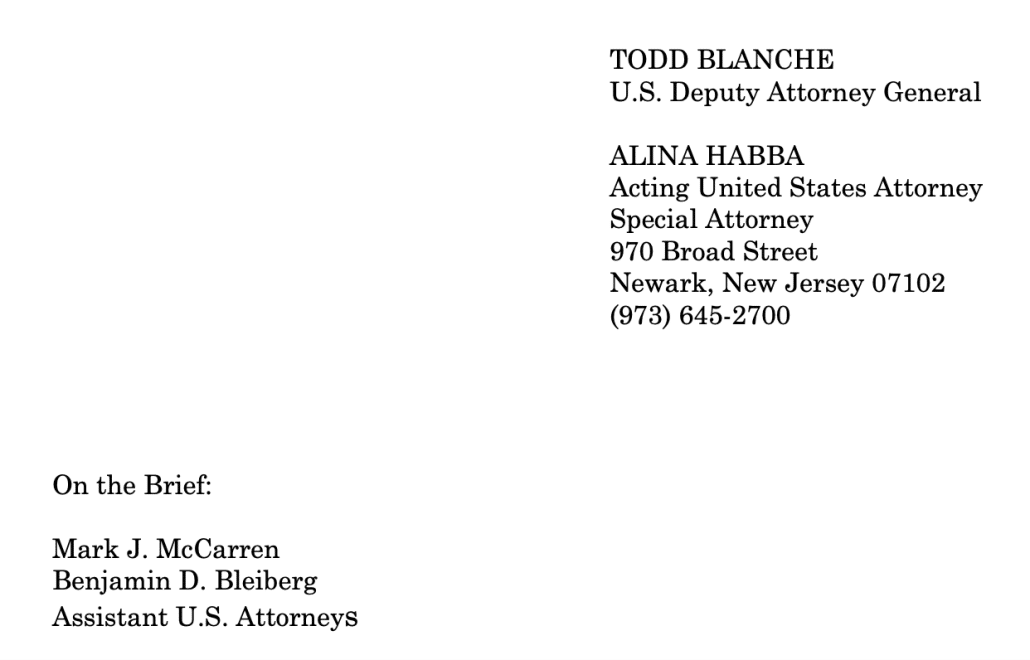There’s a footnote about a quarter-way through DOJ’s omnibus response to LaMonica McIver’s package of motions to dismiss the criminal case against her, in which two AUSAs purport to explain something funny that happened with the January 6 pardons: That pending defendants, whose cases Trump ordered to be dismissed, also got pardons.
10 On September 2, 2025, the undersigned Assistant U.S. Attorneys spoke with the Deputy Pardon Attorney from the Office of the Pardon Attorney who confirmed that: (i) the January 6 Defendants with then-pending cases received pardons under the Pardon and were eligible to receive certificates of pardon, and (ii) that any January 6 Defendant was still considered pardoned even if a certificate of pardon was not requested. Additionally, the Deputy Pardon Attorney provided examples of certificates of pardon issued for January 6 Defendants with previously pending cases who requested a certificate.
The two AUSAs in question are Mark McCarren, the only DOJ attorney who has filed a notice of appearance on the case and Benjamin Bleiberg, whose name appears as author in the document properties, but who hasn’t filed a notice of appearance, a tactic that at least one, more senior, DOJ attorney has used to pretend to remain ignorant of case events in other politically sensitive cases.
The men offer no declaration — from either the Deputy Pardon Attorney or themselves — to substantiate this claim. Just a footnote: Yep, January 6 defendants, all of them, got pardons.
The footnote is a crucial part of the larger argument the men use to rebut McIver’s claim of selective prosecution. As I noted (thinking she was being clever), the comparator McIver used to say that others would not have been charged for the actions alleged against her, she argued that the January 6 defendants were not even prosecuted for much more egregious instances of assault. “A substantial number of those brave officers were seriously injured. Yet, the Department of Justice has dropped the charges against over 160 individuals accused of that conduct.” But this section, the entire response to McIver’s selective prosecution claim, adopts an even more clever approach.
The Jan6ers didn’t have their cases dismissed, as McIver claims, the DOJ response says, but instead were all pardoned.
All of them.
Now, before I explain this argument, I should explain something else.
In addition to McCarren — who filed a notice of appearance — and Bleiberg — who did not, Todd Blanche is on the filing, presumably because Alina Habba has been found, by multiple judges, to be serving unlawfully as Acting US Attorney. Unlike the other cases on which Blanche is signing off, as far as I know, Blanche is intimately involved in this one.
For example, the filing confirms a claim McIver made: that before a bunch of ICE officers including the alleged victim Ricky Patel — all of whom report to Kristi Noem — moved to arrest Newark Mayor Ras Baraka, Patel announced “I am arresting the mayor . . . even though he stepped out, I am going to put him in cuffs . . . per the Deputy Attorney General of the United States.”
The SAC then gathered more than a dozen of the ICE officers and agents and announced that after consulting with the Deputy Attorney General, the group would be proceeding out the gate to effect the arrest of the Mayor.
That consultation, followed by Blanche’s inclusion on the prosecution chain of command, creates all sorts of conflicts with this case, not least the claim that ICE’s decision to turn on (some, but not the most important) bodycams before the arrest of Baraka was a decision unrelated to McIver’s oversight role and unrelated to any prosecutorial decision, an argument the omnibus makes in its attempt to rebut McIver’s selective enforcement claim.
None of this establishes that any law enforcement action taken against her was motivated by her Congressional oversight role or her policy views on immigration. But before addressing each of these enumerated claims, however, any “enforcement action” taken against McIver was quite limited, consisting of capturing video footage of her actions via body worn cameras, reviewing that footage and making it available to the U.S. Attorney’s Office for review regarding prosecutorial decisions. The most important of these “enforcement actions” was, of course, the decision to capture the footage depicting McIver’s actions on May 9, 2025. Most of the actions taken thereafter essentially involved reviewing that footage and interviewing prospective witnesses.
Significantly, the DHS agents’ decision to make the body-worn video recordings, which contained the core evidence against McIver, had nothing to do with an “enforcement action” directed at her. Rather, their purpose was to document the arrest of the Mayor. That these recordings captured the illegal actions allegedly committed by McIver was purely serendipitous from law enforcement’s perspective. When DHS officers turned on their body-worn cameras, no one knew that Defendant would barge out of the gate of Delaney Hall and attempt to forcibly interfere with and impede the arrest of the Mayor, for yet a second time, as described in the Indictment. In short, the video documentation of McIver’s allegedly criminal behavior was gathered inadvertently because of her unanticipated and surprising actions, and not because of some illicit motive on the part of DHS agents. That alone defeats her selective enforcement claim, because McIver cannot show “clear evidence” of discriminatory purpose towards her in the agents’ decision to document the Mayor’s arrest.
Worse, a long section addressing the decision to halt Public Integrity consultations — which happened by May 9, because Habba’s office tried to consult PIN on what they claim is something else that same day — reveals that in lieu of such consultations, Habba consulted … Todd Blanche’s office.
Despite the change in policy, prosecutors from the U.S. Attorney’s Office did in fact consult with ODAG about the Defendant’s case. The substance of that consultation is, of course, privileged.
So Todd Blanche ordered another agency’s men to carry out the Baraka arrest, he or his office provided the “privileged” advice to the prosecutorial team he now leads on whether to charge McIver, and oh by the way why did the AUSAs consult the Deputy Pardon Attorney about what happened at the beginning of the Trump Administration instead of the Pardon Attorney?
Two simple reasons. First, because Blanche fired the Pardon Attorney, Elizabeth Oyer, on March 7, which has itself led to a (FOIA) lawsuit. And, after the Senate refused to confirm Ed Martin — who had been acting as US Attorney for DC even while still representing a January 6 defendant — DOJ made Martin the Pardon Attorney.
All that is interesting because of some discrepancies in the description of what happened, legally, to the January 6 defendants.
A longer passage describes that Trump granted a blanket pardon for “offenses relating to events at or near” the US Capitol on January 6, and “in addition to including almost all of the January 6 Defendants who were convicted and sentenced,” Trump also “broadly pardoned all defendants associated with January 6 who were charged and awaiting trial or sentencing.”
On January 20, 2025, President Trump issued a Proclamation granting a blanket pardon or commutation of sentences “for certain offenses relating to the events at or near the United States Capitol on January 6, 2021” (the “Pardon”).4 According to President Trump, “[t]his proclamation ends a grave national injustice that has been perpetrated upon the American people over the last four years and begins a process of national reconciliation.” Id. In an executive order issued the same day (the “Weaponization Executive Order”), President Trump asserted that “the Department of Justice has ruthlessly prosecuted more than 1,500 individuals associated with January 6, and simultaneously dropped nearly all cases against BLM [Black Lives Matter] rioters,” as an example of “weaponization of prosecutorial power” under the prior administration that the administration aimed to address.5
In addition to including almost all the January 6 Defendants who were convicted and sentenced, President Trump, “[a]cting pursuant to the grant of authority in Article II, Section 2, of the Constitution of the United States,” also broadly pardoned all defendants associated with January 6 who were charged and awaiting trial or sentencing, and directed the Attorney General to dismiss any pending indictments. See Pardon; see also ECF 20-1, at 19 n.30 (citing NPR article stating “Nearly every defendant, including those who assaulted police and conspired to plan the attack, received a pardon. In 14 cases, Trump granted the defendants a commutation, ending their prison sentence, but leaving the felony on their records.”). Because the Pardon did not give the Department of Justice (“DOJ”) any discretion to continue prosecuting any of the still-pending cases for the pardoned January 6 Defendants, prosecutors immediately began filing motions to dismiss the remaining cases, including the six exemplar January 6 cases McIver cites in her brief. See ECF 20-1, at 5, 18.6
4 Granting Pardons and Commutation of Sentences for Certain Offenses Relating to the Events at or Near the United States Capitol on January 6, 2021, Proclamation No. 10887, 90 Fed. Reg. 8331 (Jan. 29, 2025), available at https://www.govinfo.gov/content/pkg/FR-2025-01-29/pdf/2025-01950.pdf.
5 See Ending the Weaponization of the Federal Government, Exec. Order No. 14147, 90 Fed. Reg. 8235 (Jan. 29, 2025), available at https://www.govinfo.gov/content/pkg/FR2025-01-28/pdf/2025-01900.pdf.
6 Citing United States v. Warnagiris, No. 21-CR-0382 (D.D.C.); United States v. Ball, No. 23-CR-160 (D.D.C.); United States v. Boughner, No. 22-CR-20 (D.D.C.); United States v. Lang, No. 21-CR-53 (D.D.C.); United States v. Amos, No. 24-CR-00395 (D.D.C.); and United States v. Adams, No. 24-MJ-337 (D.D.C.)
The filing claims to be relying on the pardon itself for the claim that defendants with pending trials were pardoned. But that’s not what the pardon said. It created 3 categories:
- Some but not all of those convicted of sedition, who got commutations but not pardons
- “[A]ll other individuals convicted of offenses related to events that occurred at or near the United States Capitol on January 6, 2021,” who got pardons
- Individuals with pending indictments, about whom the pardon instructed only to dismiss their cases with prejudice.
I further direct the Attorney General to pursue dismissal with prejudice to the government of all pending indictments against individuals for their conduct related to the events at or near the United States Capitol on January 6, 2021.
Note, there are a number of ways to show that DOJ did exercise discretion. For example, Jeremy Bertino, one of the 14 whose charges were purportedly only commuted, had to have his charges dismissed because he had not yet been sentenced. And for defendants accused of January 6 crimes plus other things — like CSAM possession found in conjunction with searches of their phones or stalking Barack Obama after getting his address from Donald Trump — DOJ has exercised a great deal of prosecutorial discretion in deciding which of those other charges to hold Trump’s mob accountable for. In short, the pardon was a legal shitshow, and DOJ has spent the months since them making shit up — another word for prosecutorial discretion.
So while I have no doubt that the pardon was treated, in part by current Pardon Attorney Ed Martin and in part by current Third Circuit judge Emil Bove (who is not mentioned in this filing even though McIver quoted him as exercising prosecutorial discretion in her own filing), as if it extended to the pending defendants, while there’s no doubt that the Pardon Attorney has been handing out pardon certificates like candy to any Jan6er who asks, that’s not actually what the pardon says.
It likely doesn’t matter for the argument, and the selective prosecution claim is likely not McIver’s strongest challenge to this indictment.
But amid James Comer’s fevered conspiracy theories about the impropriety of old man Biden’s pardons, this detail ought to get a mention.

